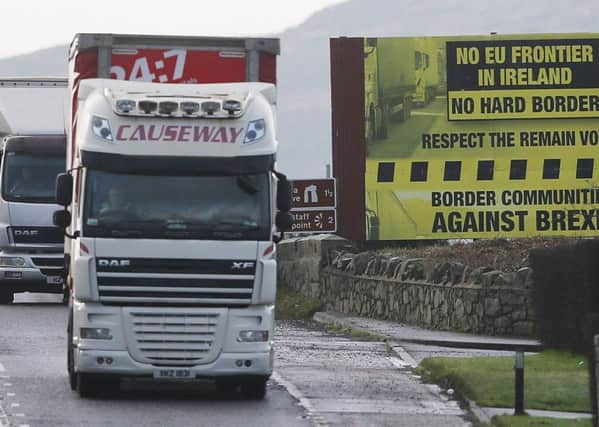Ireland should quit customs union to avoid a hard border


This is understandable, given the history of the border and also the need to preserve the stability engendered by the Good Friday Agreement. However, Dublin has completely placed the onus on the British government to come up with a solution.
It has worked on the basis that it was the UK’s decision to leave the EU that caused the problem and hence has absented itself from making any suggestions.
Advertisement
Hide AdAdvertisement
Hide AdIts only contribution was to ask the British government to stay in the single market and customs union, something that Prime Minister Theresa May and her cabinet have ruled out as not reflecting the wishes of those who voted for Brexit.


The Irish government even initially refused to enter direct talks with London on the matter, instead choosing to work only through the EU negotiators.
They have belatedly gone back on that refusal as the possibility of forcing the UK to stay in the Customs Union has receded.
However, one option which has not been seriously considered, to date, is that Ireland should itself agree to depart the EU Customs Union to preserve frictionless movement of goods and people with the UK. Since Ireland is the main beneficiary of the current arrangement, this is surprising. The Irish Government could ask the EU for a special arrangement, so it could stay in the EU but outside the EU Customs Union but maintaining, as far as possible a customs union with the UK. If this was not possible as it breaches the need to “maintain the integrity of the Union’s Legal Order”, then membership of the European Free Trade Area (EFTA), on the lines of Iceland, Norway and Liechtenstein could be considered as an option
Advertisement
Hide AdAdvertisement
Hide AdIf avoiding a hard border in Ireland is so important politically, then there is an onus on the Irish Government to examine all options for its avoidance. This option certainly has its attractions for all the parties concerned, Ireland, the UK and the EU.
There is no doubt, but that Ireland has benefitted economically and culturally from its membership of the EU. However, the attractiveness of full membership, once the UK departs, will have been reduced considerably.
The UK is still Ireland’s most important trading partner. The Welsh port of Holyhead alone took 425,000 HGV vehicles on the Irish Sea route in 2016 and is now the second busiest Ferry port in the UK, second only to Dover. Other Welsh and English ports receive large volumes of Irish goods on their way to markets around the world.
While it would be possible to establish some streamlined customs arrangements with the UK, many of these goods will ultimately pass through the English Channel ports to EU countries and be subject again to custom procedures. It would be much better to have one set of customs to deal with, rather than two.
Advertisement
Hide AdAdvertisement
Hide AdIn addition, as Ireland has prospered economically, it has moved away from being a net recipient of EU funds. The Irish net contribution this year will be over €800m and rising, soon to top the €1bn mark, similar per capita to the UK’s present contribution.
This is even before the EU proposes measures to fill the gap in the budget left by the UK’s departure. These measures are likely to adversely affect Ireland, as the EU will be seeking larger payments from the present net donors, as well as cuts to the Common Agricultural Policy (CAP), an area where Ireland gets most of its receipts from the EU.
In addition, the Irish have always mistakenly looked on the EU as an economic project. As the more grandiose political schemes of Europhiles like Macron, SPD in Germany, become more apparent, then Ireland will have less enthusiasm for Brussels.
In addition, it should be admitted that much of the Euro enthusiasm in Ireland has been traditionally a form of Anglophobia. With the UK no longer there, the love affair with Brussels will increasingly cool, as Ireland is forced to give up even more of its sovereignty.
Advertisement
Hide AdAdvertisement
Hide AdThis will be particularly true when the EU seeks to curb Ireland’s attractiveness to Foreign Direct Investment (FDI), because of its corporation tax rate of 12.5%.
The move to a common consolidated corporation tax (CCCT) would move even the most Europhile Irish politician to reconsider the country’s continued participation in the Euro project.
If Ireland was outside the EU, then the ability of Brussels to dictate its tax rates would have been eliminated. The EFTA type arrangement would, of course, maintain full and free access to the Single Market.
An EFTA type arrangement would greatly suit Ireland in the fishing area. Ireland is allocated an even smaller % of the total fish caught in its own rich fishing grounds, than the UK is in its waters. Once the UK regains control of its maritime resources, other EU countries will be looking at enhanced quotas off Ireland as compensation.
Advertisement
Hide AdAdvertisement
Hide AdIn an EFTA type arrangement, Ireland could, like Norway, greatly revive its fishing communities and, in conjunction with the UK, end the huge over fishing which is going on at present around our islands.
For Ireland, this is important because 90% of the country’s exclusive economic zone is actually maritime, by far the highest in the EU.
For Ireland to opt for an EFTA style deal with the EU, would relieve the UK of the need to solve the thorny issue of the Irish border. It would also maintain the present mutually beneficial arrangements between the two islands.
The downside for Ireland would be its exclusion from the decision-making process in Brussels. However, with a voting share of between 1-2% in the Council of Ministers, it is arguable whether Ireland, at present, has much of a say in EU law making.
Advertisement
Hide AdAdvertisement
Hide AdIn addition, there are attractions to the EU for agreeing Ireland’s exit to an EFTA linkage. The usefulness of Ireland in the negotiations has now passed, with the UK agreeing to a generous financial settlement.
To countries on the European mainland, Germany, France, Netherlands etc., it is doubtful whether the huge difficulties in finding a solution to the Irish border is worth the candle. As the EU showed in its notorious Bailout for Ireland, it was more than willing to dispense with Ireland’s national interests when faced with wider EU considerations.
Given the small size of the Irish economy, relative to the whole EU, it is extremely unlikely that the issue of the Irish border will be allowed scupper the wider deal.
Ireland is situated in the middle of anglophone North Atlantic countries, with the UK to the east and Canada to the west. It will be separated from the rest of the EU, not only by water but also by the UK. Geographically, historically and linguistically it will be an oddity in the EU.
Advertisement
Hide AdAdvertisement
Hide AdIf a free trade area is established by the USA, Canada and the UK, it would be a much more natural fit for Ireland, than to be left as a small English-speaking State on the periphery of a centralising EU Superstate.
Better to take matters into our own hands and seek EFTA membership, for a period, to assess the country’s future options, post Brexit.
• Ray Bassett is a former Irish diplomat. This is a section from a booklet he wrote for the London based Think Tank, Politeia